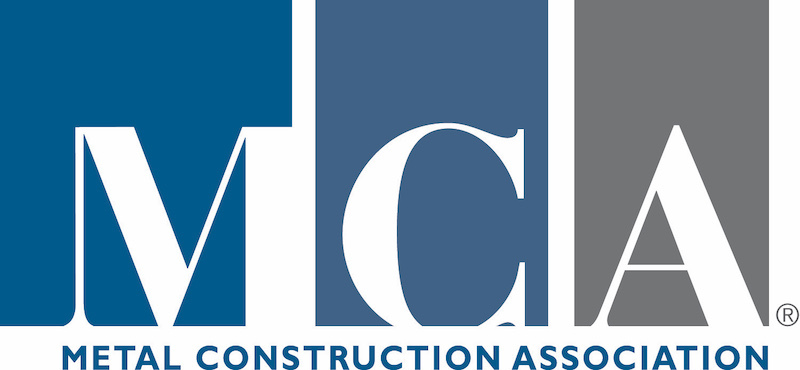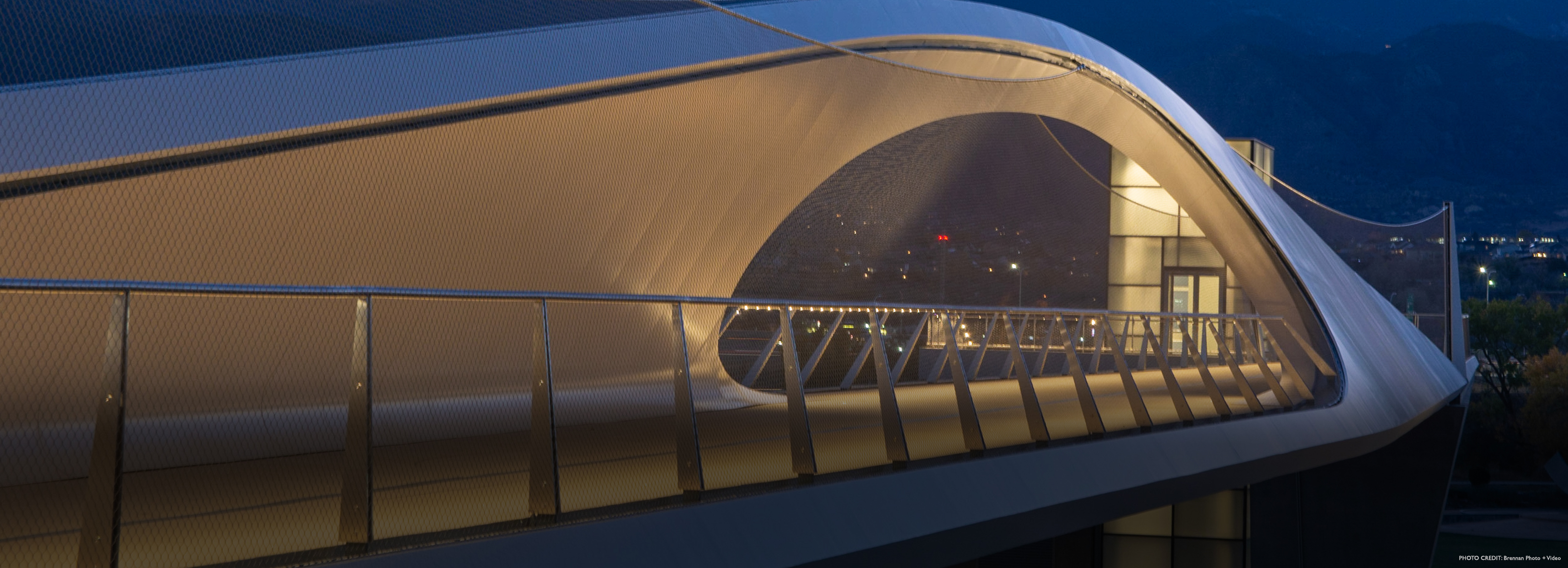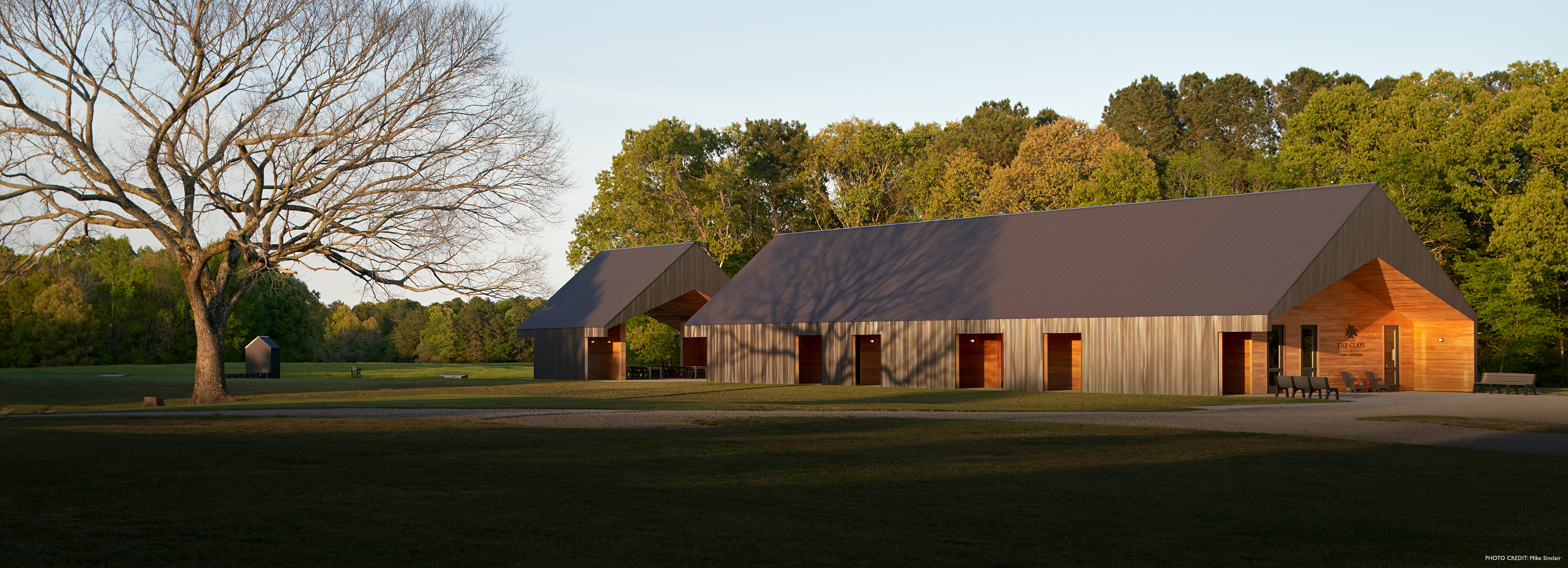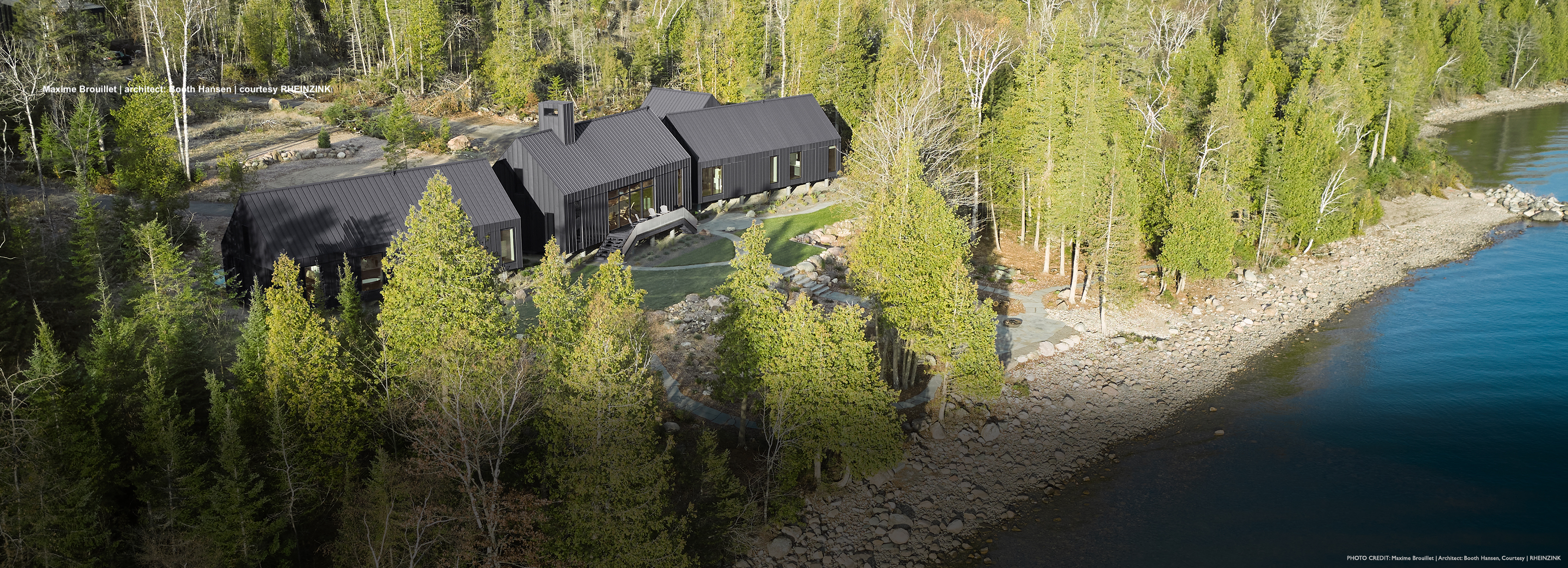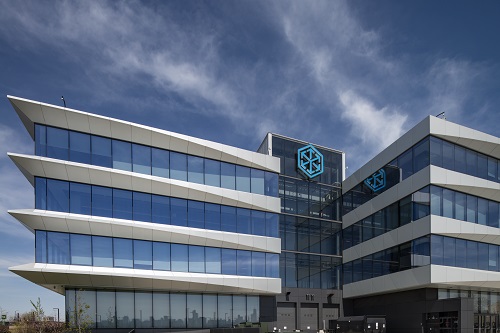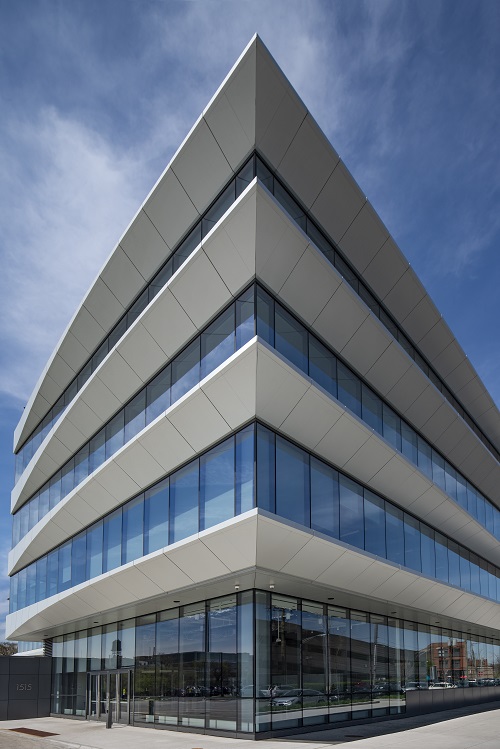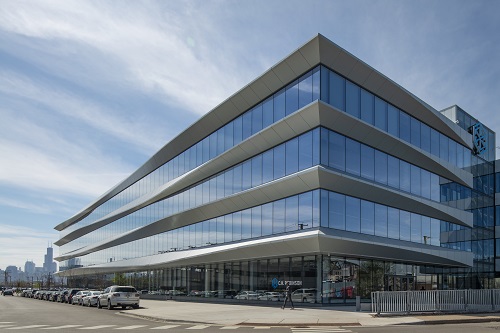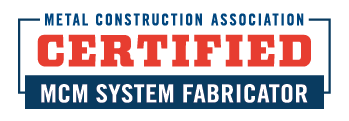Metal 'Fins' Reflect Water Movement, Reduce Glare in Energy-Efficient Riverfront Office Building
View Case Studies
The new Chicago flagship operation of logistics provider C.H. Robinson (www.chrobinson.com) opened its doors to employees in August 2018 as the first anchor tenant in the new Lincoln Yards revitalization development near the Lincoln Park neighborhood of Chicago.
Located at 1515 W. Webster Ave., the C.H. Robinson Midwest headquarters was a build-to-suit project with Chicago developer SterlingBay (www.sterlingbay.com), which had purchased a four-acre vacant industrial parcel located at Webster Avenue and the north branch of the Chicago River. Sterling Bay plans to expand Lincoln Yards to accommodate additional office, residential, hotel, entertainment and retail tenants and has acquired approximately 70 acres in the industrial area – including the historic site of the A. Finkl & Sons Steel Co.
Designed by the Chicago office of architecture and engineering firm Skidmore, Owings & Merrill LLP (SOM) (www.som.com), the new four-story office building accommodates more than 1,000 employees of C.H. Robinson, a leading global third-party logistics provider headquartered in Eden Prairie, Minn. At 207,000 square feet, the new building is more than double the size of C.H. Robinson's previous office space on North Marcey Street in Chicago and features both above- and below-grade parking as well as a 5,000 square-foot roof terrace.
This modern office building reflects its riverfront location with a design that emulates the flow of water with undulating fins fabricated from ALUCOBOND® PLUS aluminum composite material (ACM) (www.alucobondUSA.com) by 3A Composites USA, Inc.
With a design targeted to achieve LEED® Gold certification, this building incorporates low-cost, high-efficiency materials to achieve significant improvements in performance, according to an architect’s statement. It is clad in heat-reducing glass shaded by the ALUCOBOND® PLUS fins, which are designed to mitigate solar gain, reduce glare in workspaces and increase daylight in communal areas.
(Recyclable ALUCOBOND® PLUS – which is manufactured with both post-manufacturing and post-consumer content – contributes LEED® credits to building projects.)
The undulating fins were created with approximately 28,240 square feet of 4mm ALUCOBOND® PLUS ACM in the Custom BMB Sunlight Silver Mica color.
(As the original aluminum composite material, ALUCOBOND® PLUS has been developed exclusively to allow architects and designers to meet the fire performance requirements of today’s building standards. Consisting of two sheets of smooth .020” aluminum thermobonded to a solid, fire-retardant core in 4mm nominal thickness, ALUCOBOND® PLUS is one component of the wall assembly that meets the requirements of fire classifications while offering the proven product properties such as flatness, formability, durability and ease of fabrication. Available in standard widths of 50 inches and 62 inches, ALUCOBOND® PLUS is available in a wide range of high quality finishes and colors as well as custom colors.)
The C.H. Robinson office building features a 30-foot setback and public landscaped park that fronts the Chicago River, offering office employees and visitors "expansive views of the water," according to a Sterling Bay statement.
"SterlingBay presented us with a challenging and exciting opportunity that we tried to resolve with a sophisticated but simple design concept," said Jorge Rovira, AIA, associate, SOM architects. "They asked us to create a design that would integrate the building with the river and that could be built efficiently. We investigated a mix of high-performance building materials to achieve LEED® certification. When we looked at the big picture for this design, we knew we wanted to bring light deep inside the space – while maximizing sustainability by controlling daylight – to create a better workplace. We introduced the idea of large 'fins' that would be shaped to reduce glare inside and offer an opportunity to reduce the window-to-wall ratio and incorporate more surface for insulation. Behind the fins, a well-proven unitized curtain wall would provide the enclosure."
These fins would be designed with profiles that would move in and out from the building to meet changing glare control requirements, according to Rovira, who said the fins would also create the perception of long waves and reflect the movement of the river.
SOM engaged the engineering expertise of Sobotec Ltd. (www.sobotec.com), of Hamilton, Ontario, Canada, to work together to turn the vision for the facade fins into reality. Mid-States Glass and Metal, Inc. (www.mid-statesglassandmetal.com), of Niles, Ill., partnered with Sobotec to work on the project with general contractor Power Construction Co., LLC (www.powerconstruction.net), of Chicago.
"We talked with Sobotec about surface requirements and the fact that every panel is twisted, creating wrapping surfaces," said Rovira. "Sobotec reviewed the fin proposal for constructability and finished our design. ...
"When we were thinking about a metallic surface, we thought ALUCOBOND® PLUS would be cost-effective and easy to handle and could be formed into different shapes. We were able to introduce a unique central atrium to bring more daylight into the building and yet remain within the project's budget because we saved building material costs by selecting ALUCOBOND® PLUS. We were quite comfortable using ALUCOBOND® PLUS aluminum composite material because we knew it could be twisted and that the corners would be sharper than those created with metal panels."
"We figured out how to do it," said Vlad Sobot, president, Sobotec, which worked with SOM in a design-assist role collaborating with installer Mid-States Glass and Metal. "From our perspective, it's what we do. ‘Adding structure to vision' is our company tag line. ...
"This was one of our more complicated projects. Every single panel in a single row is unique – from the depth of the panel to the nose. The fins move horizontally and vertically across the building; they move in and out like a wave. Engineering was a big challenge as well as fabrication because these complex shapes required a bit of a twist in each unit. This design could not have been completed with any material other than ALUCOBOND® PLUS. It is the only material that could have accommodated such complex shapes and it was as an economical choice for this project."
While SOM architects originally reviewed a white palette, the ALUCOBOND® PLUS ACM in the Custom BMB Sunlight Silver Mica color was selected as a reflective color that could withstand residual dust from the industrial site, according to Rovira.
"We wanted the brightness of silver and its reflection," said Rovira. "When light hits the silver ALUCOBOND® PLUS, it looks even brighter and almost gleams in the sun. As light hits the Chicago River, it bounces back so that you can see the river reflected on all floors of the building. The sparkling reflections and water movement are very beautiful."
Sobotec engineered and fabricated approximately 300 different ALUCOBOND® PLUS panel shapes to create the sunshade design on each of the building's four floors with one identical pattern repeating on the second and fourth floors and another pattern repeating on the third floor and roof. Each elevation features individually unique ALUCOBOND® PLUS panels creating the angled facade and contour look of the fins.
Sobotec fabricated the ALUCOBOND® PLUS panels and gussets and installed them in a unitized system in the controlled environment of the company's shop rather than in the field. The units feature a custom aluminum frame and hook and pin system with locking bars. A total of 827 finished units measuring approximately 5 feet wide by 6 feet tall were shipped to the site for installation.
Mid-States Glass and Metal first installed a continuous aluminum curtain wall designed by Bruce Wall Systems Corp., (www.brucewall.com), of Tucker, Ga., which incorporated high-performance energy-efficient glass supplied by the Owatonna, Minn., location of architectural glass fabricator Viracon (www.viracon). The sunshade units then were attached to the curtain wall with pins and pin supports integrated into the mullion system.
"This approach allowed us to first enclose the building completely and make it weather tight," said Lance Mainwaring, senior project manager, Mid-States Glass and Metal. "Then we installed the sunshades and made final adjustments."
Mid-States Glass and Metal worked closely with Sobotec engineers during sunshade installation.
"We made changes to the bracket design as we received panels on the job," said Mainwaring. "Sobotec came up with slight engineering improvements as we were working on the job site. It was a good job working as a team on this project."
SOM architects spent approximately one year designing the project; construction was completed in 1.5 years.
Now that building construction is complete, "we all agree that it looks fantastic," according to Rovira.
"It's a simple yet elegant design," said Rovira. "This facade has a nice rhythm and, up close, the river light glitters water reflections in the fins. The panels were challenging but, ultimately, were successfully executed through great teamwork."
Introduced in 1969, ALUCOBOND® is the original and world's best-known aluminum composite material. ALUCOBOND® PLUS is manufactured in the United States in the Benton, Ky., plant of 3A Composites, USA Inc. The 3A Composites USA, Inc. headquarters are based in Davidson, N.C. For more information about ALUCOBOND® PLUS ACM, call 1-800-626-3365, email info.usa@3AComposites.com or visit www.alucobondUSA.com.
® ALUCOBOND is a registered trademark of 3A Composites USA, Inc.
REQUIRED PHOTO CREDIT: © Mark Kempf Photography courtesy of 3A Composites, USA Inc.
LOCATION
1515 W Webster Ave, Chicago, IL
CONTRACTOR
Power Construction Co., LLC
MANUFACTURER
3A Composites USA Inc, Sobotec Ltd
PRODUCT
ALUCOBOND® PLUS
SIZE
207,000 square feet
DATE COMPLETED
August 2018
